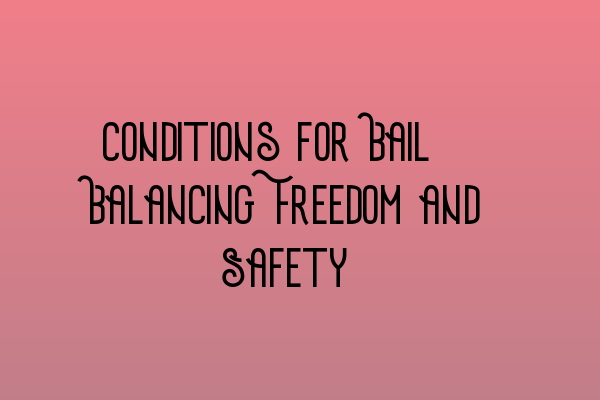Conditions for Bail: Balancing Freedom and Safety
Welcome to the SQE Criminal Law & Practice Law UK blog! In today’s post, we will be exploring the delicate balance between freedom and safety when it comes to the conditions for bail. Bail is a crucial aspect of the criminal justice system, allowing individuals to be released from custody while their case is pending. However, it is important to ensure that the conditions imposed are appropriate to maintain public safety and ensure the defendant’s appearance in court.
The Purpose of Bail
Before diving into the specific conditions for bail, let’s first understand the purpose it serves. Bail is granted to individuals who have been arrested or charged with a criminal offense. It allows them to remain free until their trial or other court appearances, rather than being held in custody. The granting of bail recognizes the principle of “innocent until proven guilty” and aims to strike a balance between the presumption of innocence and the protection of the general public.
Factors Considered in Bail Decisions
When determining the conditions for bail, the court takes into account various factors. These factors include the seriousness of the offense, the defendant’s criminal history, their ties to the community, the likelihood of reoffending, and the risk of flight. The court’s primary concern is to ensure that the defendant appears for trial and does not pose a threat to public safety. Therefore, the conditions imposed must be reasonable, proportionate, and tailored to the individual circumstances of each case.
Common Conditions Imposed for Bail
Now let’s explore some of the common conditions that may be imposed for bail:
- Restrictions on Travel: One of the most common conditions is to restrict the defendant’s travel. This may include surrendering their passport, reporting to a local police station regularly, or staying within a specified geographic area.
- Curfews: Another common condition is a curfew. Defendants may be required to remain at a designated place during specific hours, usually during the night.
- Electronic Monitoring: In some cases, electronic monitoring may be utilized to ensure compliance with bail conditions. This can include wearing an ankle bracelet that tracks the defendant’s movements.
- Non-Contact Orders: In situations where the defendant is accused of domestic violence or harassment, non-contact orders may be imposed, prohibiting any contact with the alleged victim.
- Financial Sureties: Bail conditions may also include requiring the defendant to provide a financial surety, such as a cash deposit, to ensure their appearance in court.
These are just a few examples of the wide range of conditions that can be imposed for bail. It is worth noting that the conditions set must be reasonable and necessary. They should not unduly restrict the defendant’s rights or liberties, nor should they be punitive in nature.
Review and Amendment of Bail Conditions
It is vital to remember that bail conditions are not set in stone and can be reviewed and amended throughout the legal proceedings. If the circumstances change or new information comes to light, the court may reconsider the conditions and either relax or tighten them accordingly.
Workshops and Seminars on Criminal Practice: Expanding Your Expertise
Mastering MCQ Strategies for SQE Criminal Law: Conquer the Exam
Updates in UK Criminal Laws: Staying Informed and Prepared
Burden of Proof in Criminal Law: Unraveling Legal Responsibility
Mock Tests for SQE Criminal Practice: Exam Simulation for Success
We hope this article helped shed some light on the conditions for bail and the importance of balancing freedom and safety. If you’re interested in expanding your expertise in criminal practice, be sure to check out our workshops and seminars on criminal practice. For those preparing for the SQE Criminal Law exam, our MCQ strategies article might be just what you need to conquer the exam.
Stay informed and prepared with our regular articles on the updates in UK criminal laws. If you have any questions about the burden of proof in criminal law or need assistance with mock tests for the SQE Criminal Practice exam, our team is here to help. Feel free to reach out to us!
Thank you for reading, and we look forward to sharing more valuable insights with you soon.
